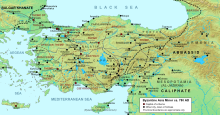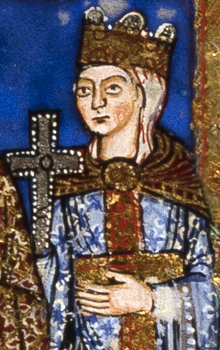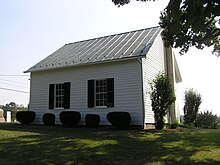Portal:History
The History Portal

History by Frederick Dielman
History (derived from Ancient Greek ἱστορία (historía) 'inquiry; knowledge acquired by investigation') is the systematic study and documentation of the human past. History is an academic discipline which uses a narrative to describe, examine, question, and analyze past events, and investigate their patterns of cause and effect. Historians debate which narrative best explains an event, as well as the significance of different causes and effects. Historians debate the nature of history as an end in itself, and its usefulness in giving perspective on the problems of the present.
The period of events before the invention of writing systems is considered prehistory. "History" is an umbrella term comprising past events as well as the memory, discovery, collection, organization, presentation, and interpretation of these events. Historians seek knowledge of the past using historical sources such as written documents, oral accounts or traditional oral histories, art and material artifacts, and ecological markers.
Stories common to a particular culture, but not supported by external sources (such as the tales surrounding King Arthur), are usually classified as cultural heritage or legends. History differs from myth in that it is supported by verifiable evidence. However, ancient cultural influences have helped create variant interpretations of the nature of history, which have evolved over the centuries and continue to change today. The modern study of history is wide-ranging, and includes the study of specific regions and certain topical or thematic elements of historical investigation. History is taught as a part of primary and secondary education, and the academic study of history is a major discipline in universities.
Herodotus, a 5th-century BCE Greek historian, is often considered the "father of history", as one of the first historians in the Western tradition, though he has been criticized as the "father of lies". Along with his contemporary Thucydides, he helped form the foundations for the modern study of past events and societies. Their works continue to be read today, and the gap between the culture-focused Herodotus and the military-focused Thucydides remains a point of contention or approach in modern historical writing. In East Asia a state chronicle, the Spring and Autumn Annals, was reputed to date from as early as 722 BCE, though only 2nd-century BCE texts have survived. The title "father of history" has also been attributed, in their respective societies, to Sima Qian, Ibn Khaldun, and Kenneth Dike. (Full article...)
Featured picture
Did you know (auto generated)

- ... that Galena Schoolhouse in South Dakota was once leased to a historical society for $1 annually?
- ... that an Armenian Apostolic Church lawsuit over the Zeytun Gospels led Heghnar Zeitlian Watenpaugh to write a history of its separated canon tables?
- ... that the Oxtongue River, historically a canoe route for indigenous people, is still used for recreational canoeing?
- ... that the 1971 Hazelwood massacre was the largest mass murder in the history of "Murder City"?
- ... that soccer player Danielle Marcano scored four goals in back-to-back games that helped to send the University of Tennessee to the NCAA tournament quarterfinals for the first time in history?
- ... that the first game in Georgetown football history was never played?

Harriet Arbuthnot (née Fane; 10 September 1793 – 2 August 1834) was an early 19th-century English diarist, social observer and political hostess on behalf of the Tory party. During the 1820s she was the closest woman friend of the hero of Waterloo and British Prime Minister, the 1st Duke of Wellington. She maintained a long correspondence and association with the Duke, all of which she recorded in her diaries, which are consequently extensively used in all authoritative biographies of the Duke of Wellington.
Born into the periphery of the British aristocracy, her parents were Henry Fane and his wife, Anne, née Batson; she married a politician and member of the establishment, Charles Arbuthnot. Thus well connected, she was perfectly placed to meet many of the key figures of the Regency and late Napoleonic eras. Recording meetings and conversations often verbatim, she has today become the "Mrs. Arbuthnot" quoted in many biographies and histories of the era. Her observations and memories of life within the British establishment are not confined to individuals but document politics, great events and daily life with an equal attention to detail, providing historians with a clear picture of the events described. Her diaries were themselves finally published in 1950 as The Journal of Mrs Arbuthnot. (Full article...)
On this day
November 7: International Inuit Day
- 1723 – O Ewigkeit, du Donnerwort, BWV 60, a dialogue cantata by Johann Sebastian Bach for Leipzig, was first performed.
- 1837 – American abolitionist Elijah Parish Lovejoy was murdered by a pro-slavery mob in Alton, Illinois, during an attack to destroy his printing press and abolitionist materials.
- 1934 – The first specimens of the tufted jay (pictured) to be scientifically described were collected in Mexico.
- 1949 – Oil was discovered in the Caspian Sea off the coast of Azerbaijan, leading to the construction of Neft Daşları, the world's first offshore oil platform.
- 1987 – Singapore's first Mass Rapid Transit line opened, with train services running between Yio Chu Kang and Toa Payoh.
- 1991 – Magic Johnson announced his retirement from professional basketball due to HIV infection.
- Ibn Hazm (b. 994)
- Paul Sandby (d. 1809)
- Ruby Hurley (b. 1909)
- Ellen Stewart (b. 1919)
Selected quote
There cannot be two suns in the sky, nor two emperors on the earth.
— Confucius, Chinese Sage and Philosopher
Related portals
More Did you know...
- ... that the underground Fortress of Mimoyecques (pictured) was built by Nazi Germany to bombard London with 10 shells a minute using the V-3 supergun?
- ... that Howard P. Perry was the first African American recruit in the United States Marine Corps?
- ... that the Chester city walls form the most complete circuit of Roman and medieval defensive town walls in Britain?
- ... that China's first female director was adopted by the first Premier of the People's Republic of China?
- ... that the Medieval Merchant's House in Southampton was being used as a brothel when bomb damage during the Blitz revealed the building's important medieval architecture?
- ... that the Sumerian "river of paradise", the Hubur, derived partly from real geography before becoming a demonic fantasy?
- ... that Bill Foley's photograph "The Last Smile" shows Anwar Sadat only moments before his assassination?
- ... that the 1911 Sarez earthquake triggered a huge landslide, forming the tallest dam in the world?
Topics
Categories

History • By period • By region • By topic • By ethnic group • Historiography • Archaeology • Books • Maps • Images • Magazines • Organizations • Fictional • Museums • Pseudohistory • Stubs • Timelines • Chronology • People • Wikipedia historians
WikiProjects
![]() WikiProject History •
Ancient Near East • Australian History • Classical Greece and Rome • Dacia • Former countries • History of Canada • Chinese history • European history • Heraldry and vexillology • Indian history • Jewish history • Medieval Scotland • Mesoamerica • Military history • Middle Ages • History of Science
WikiProject History •
Ancient Near East • Australian History • Classical Greece and Rome • Dacia • Former countries • History of Canada • Chinese history • European history • Heraldry and vexillology • Indian history • Jewish history • Medieval Scotland • Mesoamerica • Military history • Middle Ages • History of Science
WikiProject Time • Days of the Year • Years
WikiProject Biography • Composers • Political figures • Saints • United States Presidents
Things you can do
 |
Here are some tasks awaiting attention:
|
Associated Wikimedia
The following Wikimedia Foundation sister projects provide more on this subject:
-
Commons
Free media repository -
Wikibooks
Free textbooks and manuals -
Wikidata
Free knowledge base -
Wikinews
Free-content news -
Wikiquote
Collection of quotations -
Wikisource
Free-content library -
Wikiversity
Free learning tools -
Wiktionary
Dictionary and thesaurus





















































